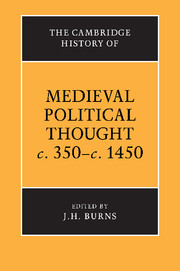Introduction
Published online by Cambridge University Press: 28 March 2008
Summary
The character of ‘medieval political thought’ is problematic. Its very existence, as an identifiable entity or subject, may be questioned, and has been denied. Yet such doubts and denials seem less than plausible in the light of the sustained and fruitful scholarly investigation and exposition that the subject – though not always under this title – has received for the best part of a century. Some aspects of that historiography will be considered in a moment. First, however, something needs to be said more directly about the nature of the subject itself. It is no doubt true that if certain definitions of ‘political thought’ are accepted it will be hard to find such thought in the period surveyed in this book. For most medieval thinkers the analysis, whether conceptual or institutional, of ‘politics’ in its original Greek sense was neither relevant nor possible. Even after the so-called ‘Aristotelian revolution’ of the thirteenth century this is still substantially true. Concepts and terminology derived from Aristotle's Politics then indeed became common intellectual currency; and yet there is no medieval work challenging even distant comparison with that massive treatise. The influence of Platonic or neo-Platonic ideas was no doubt more continuous, though the light it shed was refracted; but there is no medieval text of the character, let alone the calibre, of Plato's Republic. Ideas, whether Platonic or Aristotelian, rooted in the life of the polis or city-state had at best a limited application in most medieval societies.
- Type
- Chapter
- Information
- Publisher: Cambridge University PressPrint publication year: 1988
References
- 1
- Cited by

